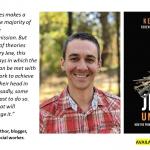
“Deconstruction is a symptom, not the root cause,” says Joshua Ryan Butler of The Gospel Coalition.
On the surface, and I’m not entirely certain, but this statement could make sense. However, unlike Joshua Ryan Butler, I don’t view deconstruction as a negative thing. To riff off the medical analogy, I don’t see deconstruction as the symptom of a disease process. Rather, it is the symptom – if you want to even use that word – of a sincere and forthright questioning of one’s worldview.
This is what is so often missed by folks like The Gospel Coalition; and it’s why we at Quoir Publishing wrote our Amazon best-selling response book Before You Lose Your Mind.
Too often, church folks like Butler attempt to give their opinions on something they have no direct experience with. Sure, they’ve spoken with folks who have or are deconstructing. But they’ve rarely deconstructed anything themselves. And so, when they attempt to put forth their diagnoses, they often miss the mark worse than a Stormtrooper in a Lucas film.
Now, it is true, as Butler notes, that many deconstruct their faith because they’ve 1) been hurt by the church and 2) they’ve been force fed poor teaching. When we dig down into the meat of what he says, however, we find his diagnosis to be lacking any real depth at all.
Church Hurt
The first reason Butler says people deconstruct is because they’ve been burned by the church. He writes, “Church hurt is real. But deconstruction is a false cure.”
Okay, I actually agree with him there. Here’s the thing, though: While deconstruction may be a “false cure,” it is a necessary step on the road to recovering from the trauma caused by church hurt.
You see, in spite of what Butler says, no one in my circles thinks that deconstruction is a cure for anything. Rather, we all realize it is a process that helps shed light on things. Deconstruction, in the non-Derridian sense of the word, is something that must be done in order to start seeing things with clearer eyes. To again riff off the medical analogy Butler likes to use, deconstruction is a treatment that clears up the symptoms of trauma caused by the church, but it is not the end-all-be-all when it comes to a healthy spiritual life.
Poor Teaching
This is another thing Butler gets right, but only on the surface. While Butler is correct that poor theology leads to deconstruction, he is incorrect as to what constitutes poor theology.
Not to shamelessly plug the book again, but that’s exactly why we subtitled Before You Lose Your Mind with “Deconstructing Bad Theology in the Church.” And when we say “bad theology,” we mean the type of theology that kills. Like, literally leads to death (spiritual and bodily).
Anti LGBTQ-inclusion.
Violent atonement theories.
A God of vengeance and wrath.
Hell as eternal conscious torment.
Pro blood sacrificial systems.
Nationalism.
Patriarchal teachings like complementarianism.
White supremacy.
These are the things that need to be deconstructed, but it’s exactly the teachings that the church, including The Gospel Coalition, refuses to budge on. They’re not budging on the LGBTQ issue. They’re not budging on penal substitution. They’re not budging on a God of wrath. They’re not budging on hell. They’re not budging on pro-sacrificial systems. And they’re not budging on women in leadership.
All this, in spite of the fact that these theologies bring about harm and trauma.
Street Cred and a Desire to Sin
The next two reasons Butler gives are – how should I put this tactfully? – complete horseshit. This is victim shaming. This is having an inability to actually listen to people. This is, while not surprising, built into the very fabric of church culture, which is a part of why people deconstruct in the first place. Remember point 1? Church harm? Yeah, this is a part of that.
When people deconstruct, they don’t do it to justify their sin or because it’s “cool” or “popular.” Yes, Rob Bell ended up on Oprah. But do you know what happened first? He got canceled by John Piper. Remember “Farewell, Rob Bell?” I do. Bell lost everything before he gained anything.
So, while Butler claims that he doesn’t “know the heart” of those who deconstruct, he sure seems to know that people deconstruct so they can get some street cred. Again, is this not a part of the “church harm” problem? So-called leaders of the faith, on the one hand not claiming to know why people are doing what they are doing, but on the other, telling the world exactly why they are doing what they are doing.
Gross.
Diagnosis and Cure
At the end of the day, what matters most when it comes to deconstruction is this: You are not alone. There are many of us who are questioning or have questioned their faith. There are many of us who have lost everything. We are with you. We’ve gone through this. And we’ve learned that it’s okay to not be okay.
I know that folks like Butler want to put together nice and tidy listicles, attempting to explain the phenomenon of why people are walking away from their patriarchal, wrath-filled, anti-woman and anti-LGBTQ churches, but they just don’t get it. Why? Because they aren’t really listening to people. They aren’t standing alongside them in solidarity and listening. Sure, they may be eloquent. They may be articulate. Some can even write good 😉 But most are simply not paying attention. And if they continue to not pay attention, then guess what? People are going to keep walking away, and for good reason.
Fortunately, when you walk away, chances are you will discover that you are only walking away from something that isn’t actually helping you in any way, shape, or form. Because here’s the rub: When you deconstruct, you pave the way for reconstruction. The two go hand in hand. You tear down harmful beliefs, only to discover life-bringing ones. And no matter what you conclude about theology, you discover that you are not alone in this process.
If you wanna get to know me better, please follow me on social media. I’m pretty active on all platforms:
Also, if you’ve been digging my work on here, and want to see me be able to continue writing as close to full-time as humanly possible, please take a look at my Patreon page at www.patreon.com/mjdistefano. Even $1 a month helps bigly!!!














